Business Ethics Analysis: MGMT3006 Report on Venice Case Study
VerifiedAdded on 2022/09/28
|11
|2699
|23
Report
AI Summary
This report conducts a detailed analysis of ethical issues within a Venice case study, focusing on the application of normative ethical theories. The executive summary highlights the use of utilitarianism, Kantian ethics, and virtue ethics to evaluate the actions of stakeholders, including landlords, agencies like Airbnb, cruise ships, and governmental bodies. The report delves into the impacts on local residents, the economy, and the environment, addressing issues like overtourism, economic loss, and infrastructure degradation. The analysis assesses the ethical implications of various actions, classifying stakeholders based on power, legitimacy, and urgency, and exploring issues like environmental degradation and political factors, offering insights into the ethical complexities of the case.
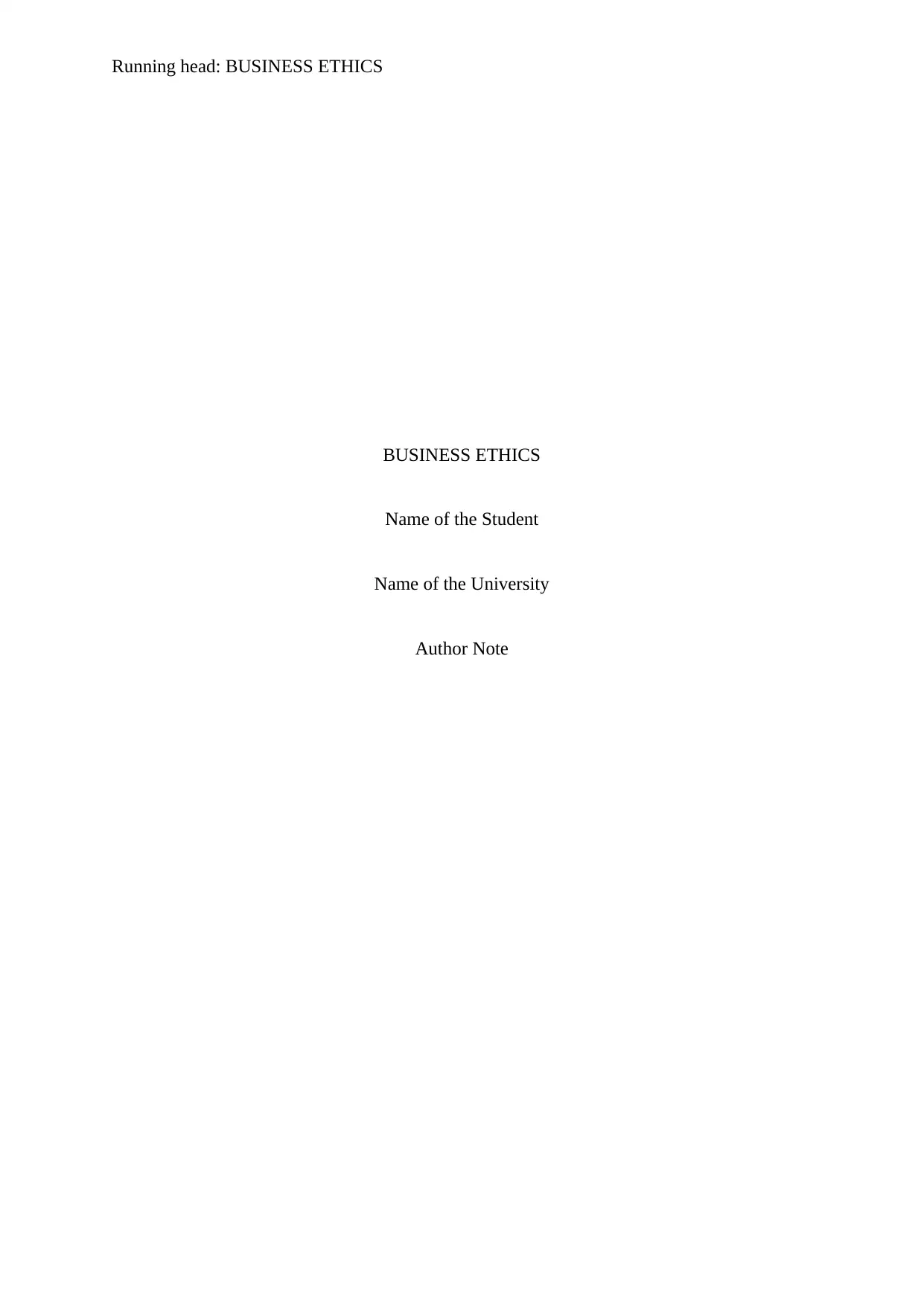
Running head: BUSINESS ETHICS
BUSINESS ETHICS
Name of the Student
Name of the University
Author Note
BUSINESS ETHICS
Name of the Student
Name of the University
Author Note
Paraphrase This Document
Need a fresh take? Get an instant paraphrase of this document with our AI Paraphraser
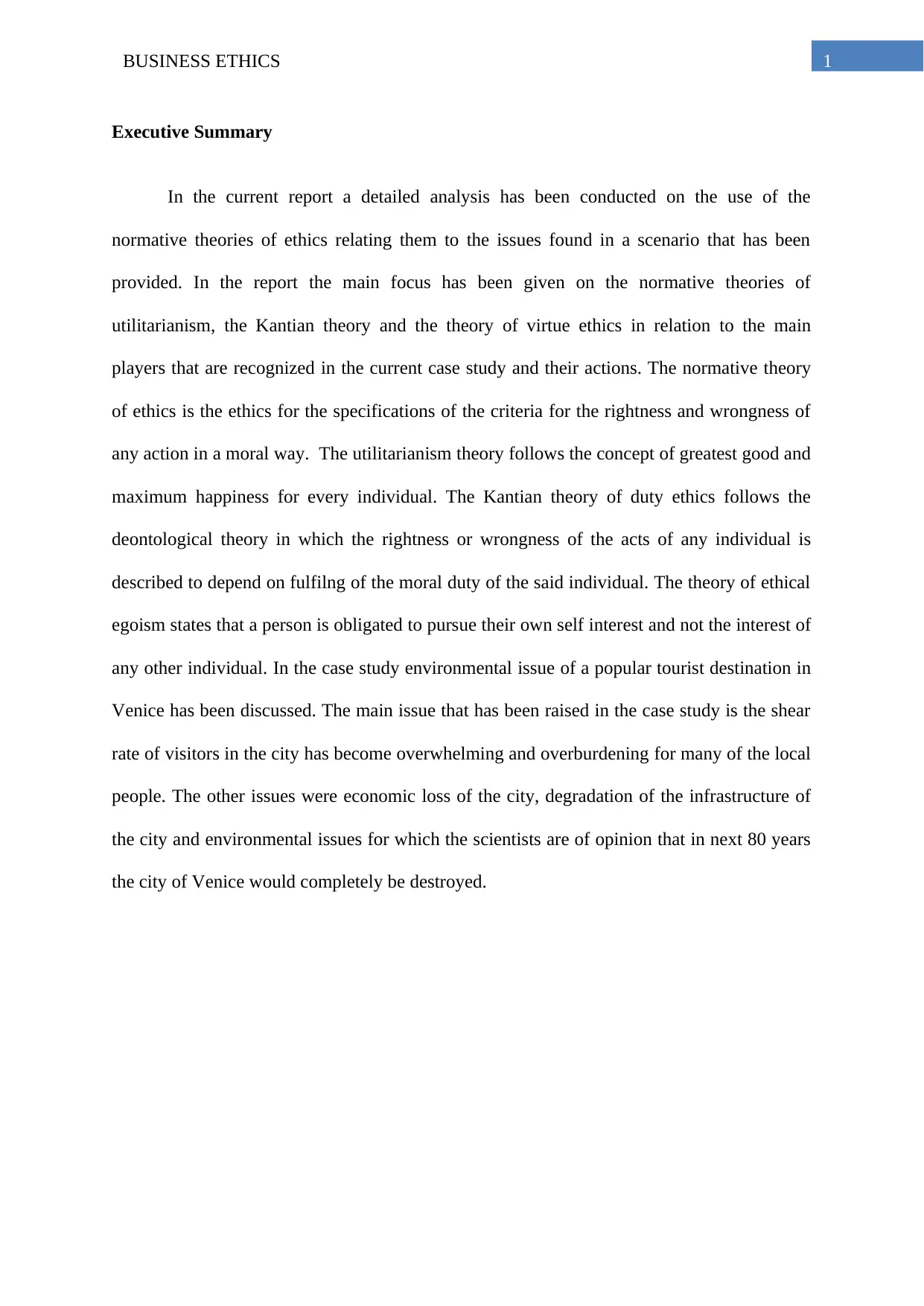
1BUSINESS ETHICS
Executive Summary
In the current report a detailed analysis has been conducted on the use of the
normative theories of ethics relating them to the issues found in a scenario that has been
provided. In the report the main focus has been given on the normative theories of
utilitarianism, the Kantian theory and the theory of virtue ethics in relation to the main
players that are recognized in the current case study and their actions. The normative theory
of ethics is the ethics for the specifications of the criteria for the rightness and wrongness of
any action in a moral way. The utilitarianism theory follows the concept of greatest good and
maximum happiness for every individual. The Kantian theory of duty ethics follows the
deontological theory in which the rightness or wrongness of the acts of any individual is
described to depend on fulfilng of the moral duty of the said individual. The theory of ethical
egoism states that a person is obligated to pursue their own self interest and not the interest of
any other individual. In the case study environmental issue of a popular tourist destination in
Venice has been discussed. The main issue that has been raised in the case study is the shear
rate of visitors in the city has become overwhelming and overburdening for many of the local
people. The other issues were economic loss of the city, degradation of the infrastructure of
the city and environmental issues for which the scientists are of opinion that in next 80 years
the city of Venice would completely be destroyed.
Executive Summary
In the current report a detailed analysis has been conducted on the use of the
normative theories of ethics relating them to the issues found in a scenario that has been
provided. In the report the main focus has been given on the normative theories of
utilitarianism, the Kantian theory and the theory of virtue ethics in relation to the main
players that are recognized in the current case study and their actions. The normative theory
of ethics is the ethics for the specifications of the criteria for the rightness and wrongness of
any action in a moral way. The utilitarianism theory follows the concept of greatest good and
maximum happiness for every individual. The Kantian theory of duty ethics follows the
deontological theory in which the rightness or wrongness of the acts of any individual is
described to depend on fulfilng of the moral duty of the said individual. The theory of ethical
egoism states that a person is obligated to pursue their own self interest and not the interest of
any other individual. In the case study environmental issue of a popular tourist destination in
Venice has been discussed. The main issue that has been raised in the case study is the shear
rate of visitors in the city has become overwhelming and overburdening for many of the local
people. The other issues were economic loss of the city, degradation of the infrastructure of
the city and environmental issues for which the scientists are of opinion that in next 80 years
the city of Venice would completely be destroyed.
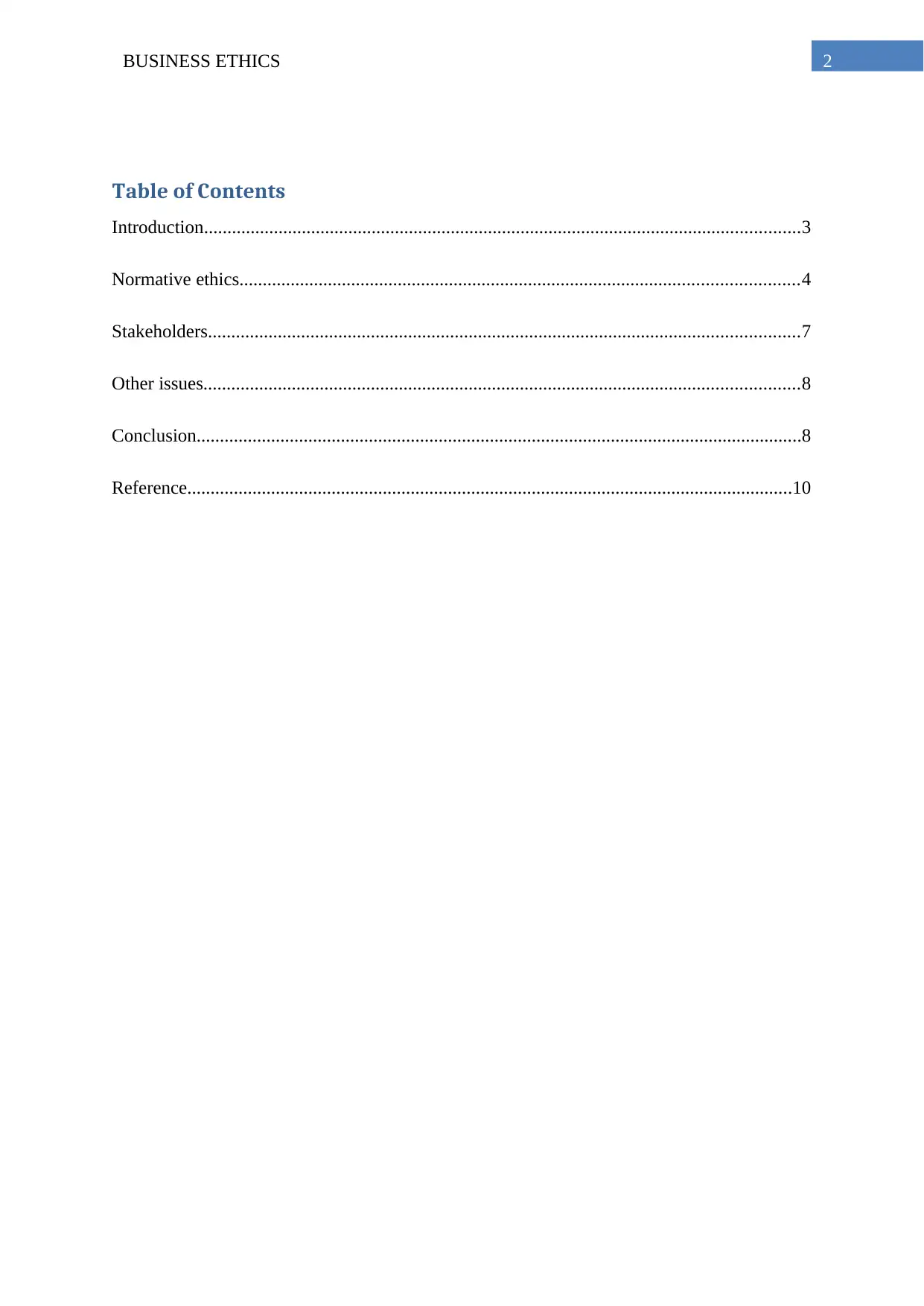
2BUSINESS ETHICS
Table of Contents
Introduction................................................................................................................................3
Normative ethics........................................................................................................................4
Stakeholders...............................................................................................................................7
Other issues................................................................................................................................8
Conclusion..................................................................................................................................8
Reference..................................................................................................................................10
Table of Contents
Introduction................................................................................................................................3
Normative ethics........................................................................................................................4
Stakeholders...............................................................................................................................7
Other issues................................................................................................................................8
Conclusion..................................................................................................................................8
Reference..................................................................................................................................10
⊘ This is a preview!⊘
Do you want full access?
Subscribe today to unlock all pages.

Trusted by 1+ million students worldwide
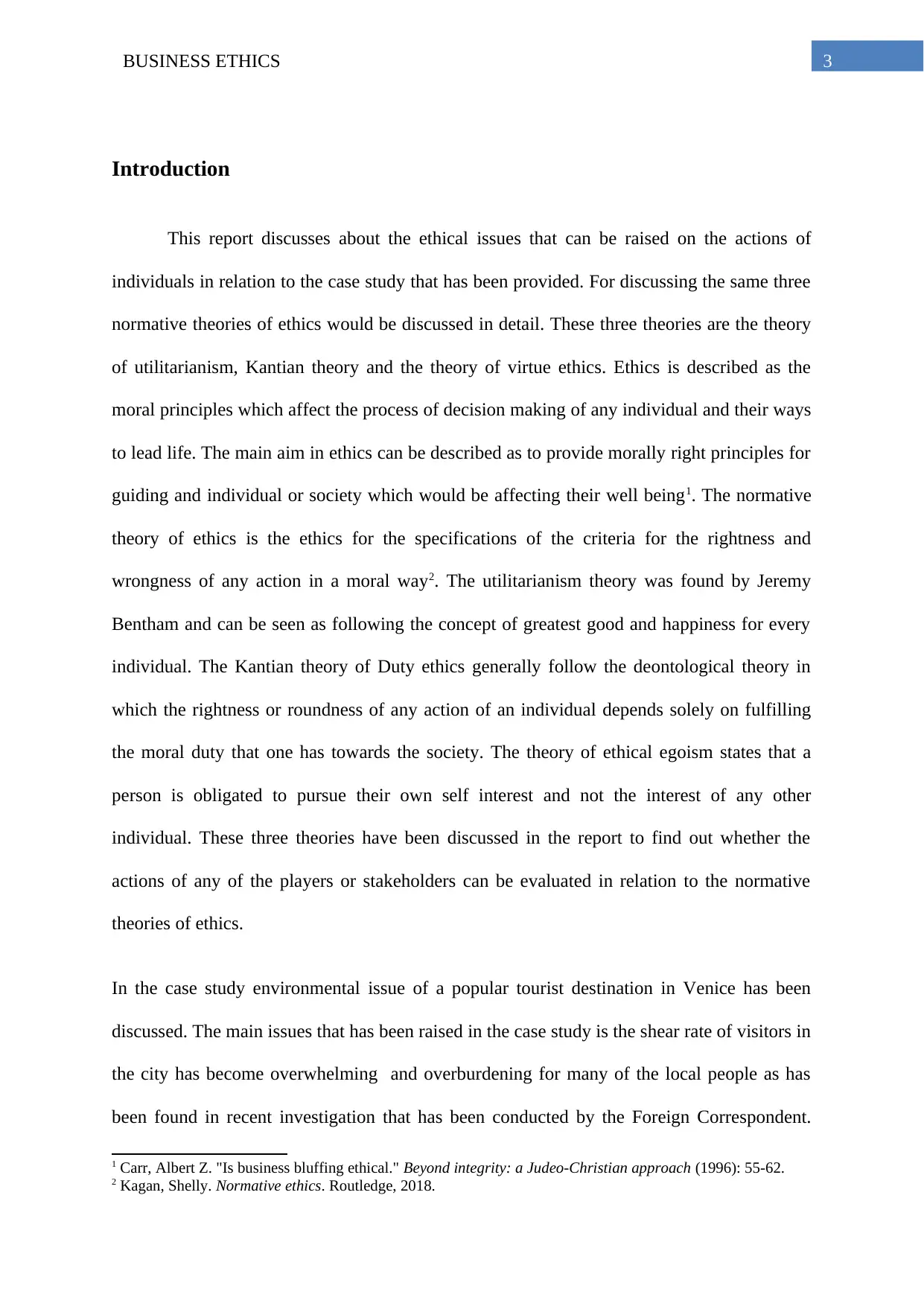
3BUSINESS ETHICS
Introduction
This report discusses about the ethical issues that can be raised on the actions of
individuals in relation to the case study that has been provided. For discussing the same three
normative theories of ethics would be discussed in detail. These three theories are the theory
of utilitarianism, Kantian theory and the theory of virtue ethics. Ethics is described as the
moral principles which affect the process of decision making of any individual and their ways
to lead life. The main aim in ethics can be described as to provide morally right principles for
guiding and individual or society which would be affecting their well being1. The normative
theory of ethics is the ethics for the specifications of the criteria for the rightness and
wrongness of any action in a moral way2. The utilitarianism theory was found by Jeremy
Bentham and can be seen as following the concept of greatest good and happiness for every
individual. The Kantian theory of Duty ethics generally follow the deontological theory in
which the rightness or roundness of any action of an individual depends solely on fulfilling
the moral duty that one has towards the society. The theory of ethical egoism states that a
person is obligated to pursue their own self interest and not the interest of any other
individual. These three theories have been discussed in the report to find out whether the
actions of any of the players or stakeholders can be evaluated in relation to the normative
theories of ethics.
In the case study environmental issue of a popular tourist destination in Venice has been
discussed. The main issues that has been raised in the case study is the shear rate of visitors in
the city has become overwhelming and overburdening for many of the local people as has
been found in recent investigation that has been conducted by the Foreign Correspondent.
1 Carr, Albert Z. "Is business bluffing ethical." Beyond integrity: a Judeo-Christian approach (1996): 55-62.
2 Kagan, Shelly. Normative ethics. Routledge, 2018.
Introduction
This report discusses about the ethical issues that can be raised on the actions of
individuals in relation to the case study that has been provided. For discussing the same three
normative theories of ethics would be discussed in detail. These three theories are the theory
of utilitarianism, Kantian theory and the theory of virtue ethics. Ethics is described as the
moral principles which affect the process of decision making of any individual and their ways
to lead life. The main aim in ethics can be described as to provide morally right principles for
guiding and individual or society which would be affecting their well being1. The normative
theory of ethics is the ethics for the specifications of the criteria for the rightness and
wrongness of any action in a moral way2. The utilitarianism theory was found by Jeremy
Bentham and can be seen as following the concept of greatest good and happiness for every
individual. The Kantian theory of Duty ethics generally follow the deontological theory in
which the rightness or roundness of any action of an individual depends solely on fulfilling
the moral duty that one has towards the society. The theory of ethical egoism states that a
person is obligated to pursue their own self interest and not the interest of any other
individual. These three theories have been discussed in the report to find out whether the
actions of any of the players or stakeholders can be evaluated in relation to the normative
theories of ethics.
In the case study environmental issue of a popular tourist destination in Venice has been
discussed. The main issues that has been raised in the case study is the shear rate of visitors in
the city has become overwhelming and overburdening for many of the local people as has
been found in recent investigation that has been conducted by the Foreign Correspondent.
1 Carr, Albert Z. "Is business bluffing ethical." Beyond integrity: a Judeo-Christian approach (1996): 55-62.
2 Kagan, Shelly. Normative ethics. Routledge, 2018.
Paraphrase This Document
Need a fresh take? Get an instant paraphrase of this document with our AI Paraphraser
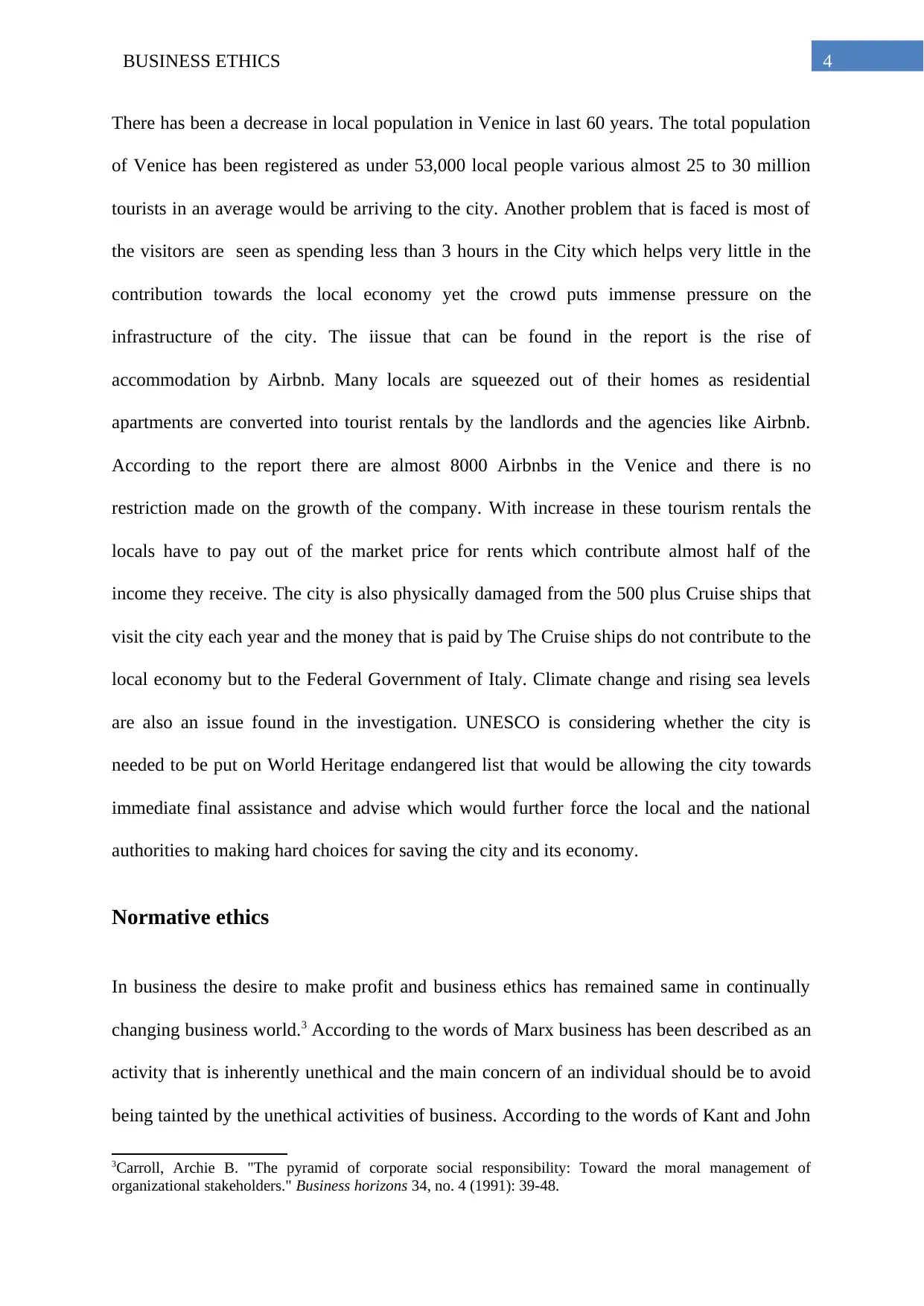
4BUSINESS ETHICS
There has been a decrease in local population in Venice in last 60 years. The total population
of Venice has been registered as under 53,000 local people various almost 25 to 30 million
tourists in an average would be arriving to the city. Another problem that is faced is most of
the visitors are seen as spending less than 3 hours in the City which helps very little in the
contribution towards the local economy yet the crowd puts immense pressure on the
infrastructure of the city. The iissue that can be found in the report is the rise of
accommodation by Airbnb. Many locals are squeezed out of their homes as residential
apartments are converted into tourist rentals by the landlords and the agencies like Airbnb.
According to the report there are almost 8000 Airbnbs in the Venice and there is no
restriction made on the growth of the company. With increase in these tourism rentals the
locals have to pay out of the market price for rents which contribute almost half of the
income they receive. The city is also physically damaged from the 500 plus Cruise ships that
visit the city each year and the money that is paid by The Cruise ships do not contribute to the
local economy but to the Federal Government of Italy. Climate change and rising sea levels
are also an issue found in the investigation. UNESCO is considering whether the city is
needed to be put on World Heritage endangered list that would be allowing the city towards
immediate final assistance and advise which would further force the local and the national
authorities to making hard choices for saving the city and its economy.
Normative ethics
In business the desire to make profit and business ethics has remained same in continually
changing business world.3 According to the words of Marx business has been described as an
activity that is inherently unethical and the main concern of an individual should be to avoid
being tainted by the unethical activities of business. According to the words of Kant and John
3Carroll, Archie B. "The pyramid of corporate social responsibility: Toward the moral management of
organizational stakeholders." Business horizons 34, no. 4 (1991): 39-48.
There has been a decrease in local population in Venice in last 60 years. The total population
of Venice has been registered as under 53,000 local people various almost 25 to 30 million
tourists in an average would be arriving to the city. Another problem that is faced is most of
the visitors are seen as spending less than 3 hours in the City which helps very little in the
contribution towards the local economy yet the crowd puts immense pressure on the
infrastructure of the city. The iissue that can be found in the report is the rise of
accommodation by Airbnb. Many locals are squeezed out of their homes as residential
apartments are converted into tourist rentals by the landlords and the agencies like Airbnb.
According to the report there are almost 8000 Airbnbs in the Venice and there is no
restriction made on the growth of the company. With increase in these tourism rentals the
locals have to pay out of the market price for rents which contribute almost half of the
income they receive. The city is also physically damaged from the 500 plus Cruise ships that
visit the city each year and the money that is paid by The Cruise ships do not contribute to the
local economy but to the Federal Government of Italy. Climate change and rising sea levels
are also an issue found in the investigation. UNESCO is considering whether the city is
needed to be put on World Heritage endangered list that would be allowing the city towards
immediate final assistance and advise which would further force the local and the national
authorities to making hard choices for saving the city and its economy.
Normative ethics
In business the desire to make profit and business ethics has remained same in continually
changing business world.3 According to the words of Marx business has been described as an
activity that is inherently unethical and the main concern of an individual should be to avoid
being tainted by the unethical activities of business. According to the words of Kant and John
3Carroll, Archie B. "The pyramid of corporate social responsibility: Toward the moral management of
organizational stakeholders." Business horizons 34, no. 4 (1991): 39-48.
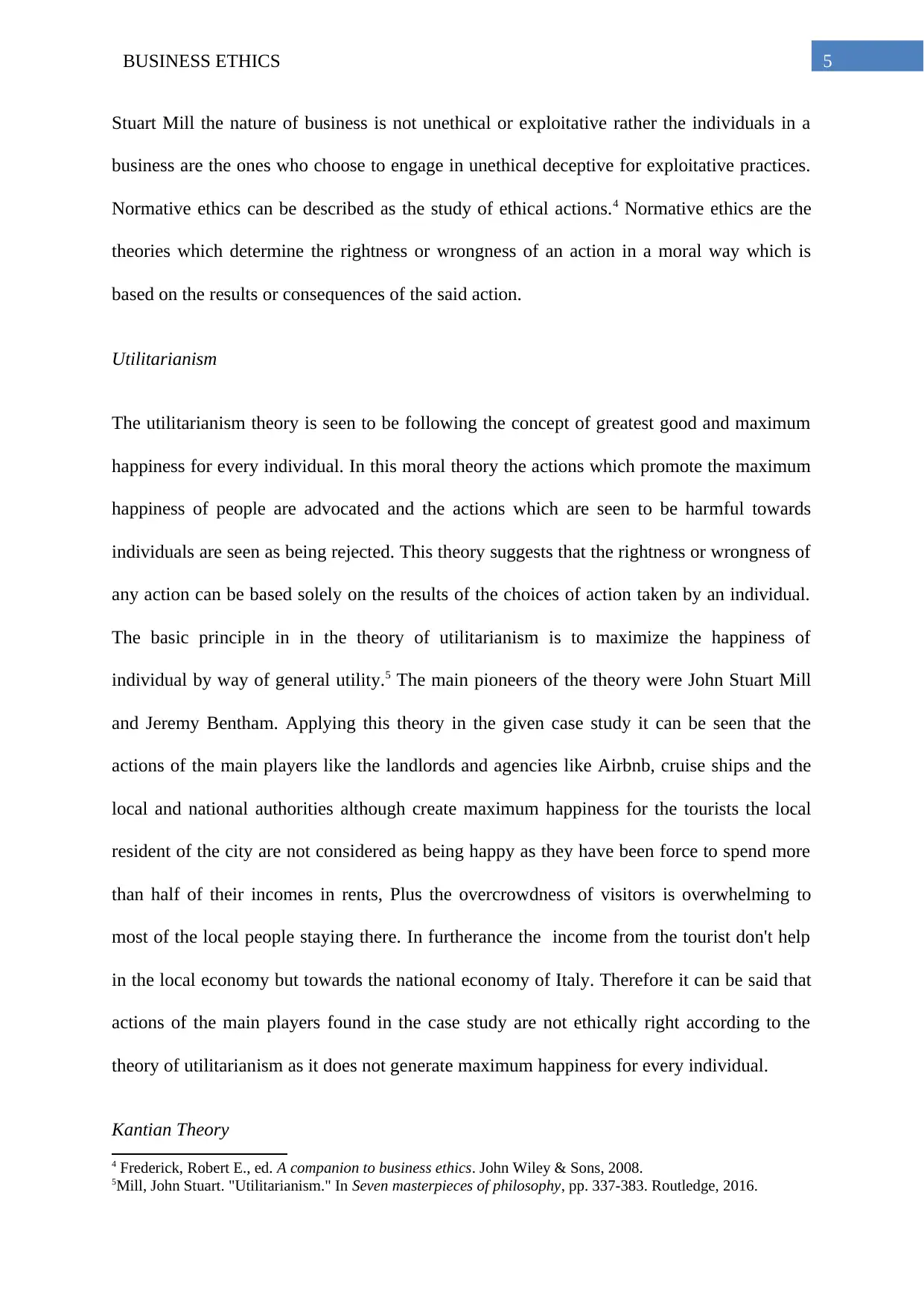
5BUSINESS ETHICS
Stuart Mill the nature of business is not unethical or exploitative rather the individuals in a
business are the ones who choose to engage in unethical deceptive for exploitative practices.
Normative ethics can be described as the study of ethical actions.4 Normative ethics are the
theories which determine the rightness or wrongness of an action in a moral way which is
based on the results or consequences of the said action.
Utilitarianism
The utilitarianism theory is seen to be following the concept of greatest good and maximum
happiness for every individual. In this moral theory the actions which promote the maximum
happiness of people are advocated and the actions which are seen to be harmful towards
individuals are seen as being rejected. This theory suggests that the rightness or wrongness of
any action can be based solely on the results of the choices of action taken by an individual.
The basic principle in in the theory of utilitarianism is to maximize the happiness of
individual by way of general utility.5 The main pioneers of the theory were John Stuart Mill
and Jeremy Bentham. Applying this theory in the given case study it can be seen that the
actions of the main players like the landlords and agencies like Airbnb, cruise ships and the
local and national authorities although create maximum happiness for the tourists the local
resident of the city are not considered as being happy as they have been force to spend more
than half of their incomes in rents, Plus the overcrowdness of visitors is overwhelming to
most of the local people staying there. In furtherance the income from the tourist don't help
in the local economy but towards the national economy of Italy. Therefore it can be said that
actions of the main players found in the case study are not ethically right according to the
theory of utilitarianism as it does not generate maximum happiness for every individual.
Kantian Theory
4 Frederick, Robert E., ed. A companion to business ethics. John Wiley & Sons, 2008.
5Mill, John Stuart. "Utilitarianism." In Seven masterpieces of philosophy, pp. 337-383. Routledge, 2016.
Stuart Mill the nature of business is not unethical or exploitative rather the individuals in a
business are the ones who choose to engage in unethical deceptive for exploitative practices.
Normative ethics can be described as the study of ethical actions.4 Normative ethics are the
theories which determine the rightness or wrongness of an action in a moral way which is
based on the results or consequences of the said action.
Utilitarianism
The utilitarianism theory is seen to be following the concept of greatest good and maximum
happiness for every individual. In this moral theory the actions which promote the maximum
happiness of people are advocated and the actions which are seen to be harmful towards
individuals are seen as being rejected. This theory suggests that the rightness or wrongness of
any action can be based solely on the results of the choices of action taken by an individual.
The basic principle in in the theory of utilitarianism is to maximize the happiness of
individual by way of general utility.5 The main pioneers of the theory were John Stuart Mill
and Jeremy Bentham. Applying this theory in the given case study it can be seen that the
actions of the main players like the landlords and agencies like Airbnb, cruise ships and the
local and national authorities although create maximum happiness for the tourists the local
resident of the city are not considered as being happy as they have been force to spend more
than half of their incomes in rents, Plus the overcrowdness of visitors is overwhelming to
most of the local people staying there. In furtherance the income from the tourist don't help
in the local economy but towards the national economy of Italy. Therefore it can be said that
actions of the main players found in the case study are not ethically right according to the
theory of utilitarianism as it does not generate maximum happiness for every individual.
Kantian Theory
4 Frederick, Robert E., ed. A companion to business ethics. John Wiley & Sons, 2008.
5Mill, John Stuart. "Utilitarianism." In Seven masterpieces of philosophy, pp. 337-383. Routledge, 2016.
⊘ This is a preview!⊘
Do you want full access?
Subscribe today to unlock all pages.

Trusted by 1+ million students worldwide
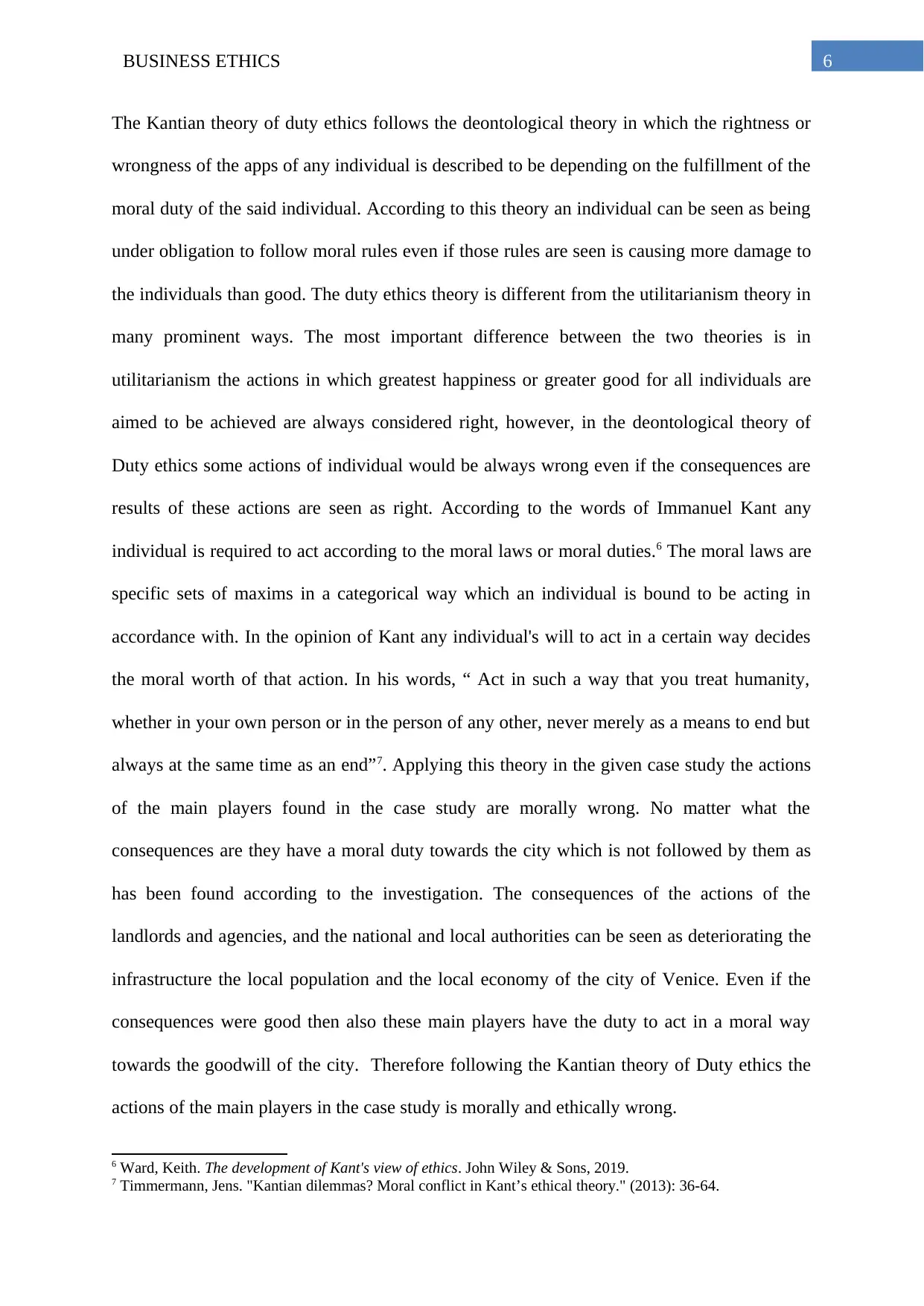
6BUSINESS ETHICS
The Kantian theory of duty ethics follows the deontological theory in which the rightness or
wrongness of the apps of any individual is described to be depending on the fulfillment of the
moral duty of the said individual. According to this theory an individual can be seen as being
under obligation to follow moral rules even if those rules are seen is causing more damage to
the individuals than good. The duty ethics theory is different from the utilitarianism theory in
many prominent ways. The most important difference between the two theories is in
utilitarianism the actions in which greatest happiness or greater good for all individuals are
aimed to be achieved are always considered right, however, in the deontological theory of
Duty ethics some actions of individual would be always wrong even if the consequences are
results of these actions are seen as right. According to the words of Immanuel Kant any
individual is required to act according to the moral laws or moral duties.6 The moral laws are
specific sets of maxims in a categorical way which an individual is bound to be acting in
accordance with. In the opinion of Kant any individual's will to act in a certain way decides
the moral worth of that action. In his words, “ Act in such a way that you treat humanity,
whether in your own person or in the person of any other, never merely as a means to end but
always at the same time as an end”7. Applying this theory in the given case study the actions
of the main players found in the case study are morally wrong. No matter what the
consequences are they have a moral duty towards the city which is not followed by them as
has been found according to the investigation. The consequences of the actions of the
landlords and agencies, and the national and local authorities can be seen as deteriorating the
infrastructure the local population and the local economy of the city of Venice. Even if the
consequences were good then also these main players have the duty to act in a moral way
towards the goodwill of the city. Therefore following the Kantian theory of Duty ethics the
actions of the main players in the case study is morally and ethically wrong.
6 Ward, Keith. The development of Kant's view of ethics. John Wiley & Sons, 2019.
7 Timmermann, Jens. "Kantian dilemmas? Moral conflict in Kant’s ethical theory." (2013): 36-64.
The Kantian theory of duty ethics follows the deontological theory in which the rightness or
wrongness of the apps of any individual is described to be depending on the fulfillment of the
moral duty of the said individual. According to this theory an individual can be seen as being
under obligation to follow moral rules even if those rules are seen is causing more damage to
the individuals than good. The duty ethics theory is different from the utilitarianism theory in
many prominent ways. The most important difference between the two theories is in
utilitarianism the actions in which greatest happiness or greater good for all individuals are
aimed to be achieved are always considered right, however, in the deontological theory of
Duty ethics some actions of individual would be always wrong even if the consequences are
results of these actions are seen as right. According to the words of Immanuel Kant any
individual is required to act according to the moral laws or moral duties.6 The moral laws are
specific sets of maxims in a categorical way which an individual is bound to be acting in
accordance with. In the opinion of Kant any individual's will to act in a certain way decides
the moral worth of that action. In his words, “ Act in such a way that you treat humanity,
whether in your own person or in the person of any other, never merely as a means to end but
always at the same time as an end”7. Applying this theory in the given case study the actions
of the main players found in the case study are morally wrong. No matter what the
consequences are they have a moral duty towards the city which is not followed by them as
has been found according to the investigation. The consequences of the actions of the
landlords and agencies, and the national and local authorities can be seen as deteriorating the
infrastructure the local population and the local economy of the city of Venice. Even if the
consequences were good then also these main players have the duty to act in a moral way
towards the goodwill of the city. Therefore following the Kantian theory of Duty ethics the
actions of the main players in the case study is morally and ethically wrong.
6 Ward, Keith. The development of Kant's view of ethics. John Wiley & Sons, 2019.
7 Timmermann, Jens. "Kantian dilemmas? Moral conflict in Kant’s ethical theory." (2013): 36-64.
Paraphrase This Document
Need a fresh take? Get an instant paraphrase of this document with our AI Paraphraser
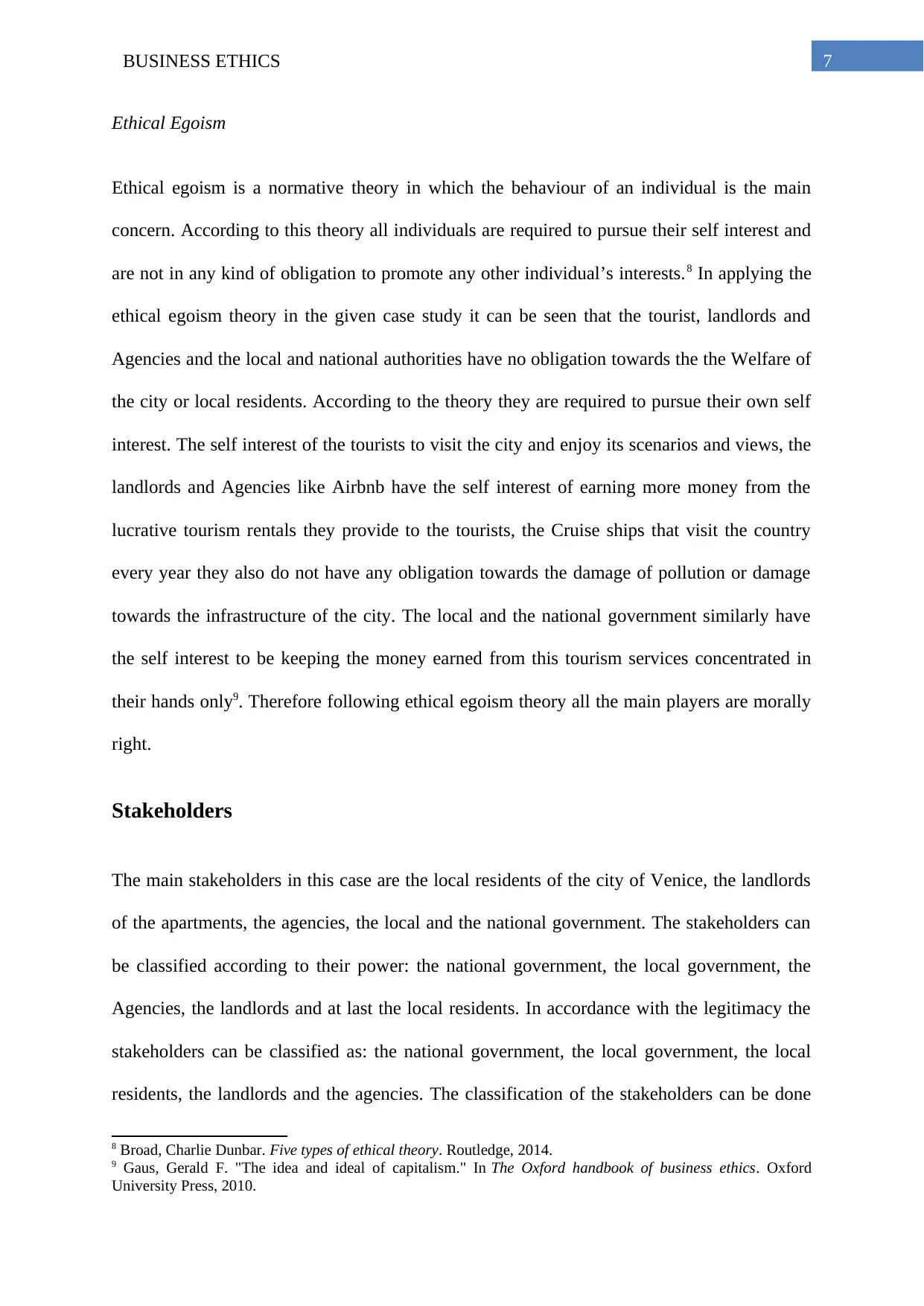
7BUSINESS ETHICS
Ethical Egoism
Ethical egoism is a normative theory in which the behaviour of an individual is the main
concern. According to this theory all individuals are required to pursue their self interest and
are not in any kind of obligation to promote any other individual’s interests.8 In applying the
ethical egoism theory in the given case study it can be seen that the tourist, landlords and
Agencies and the local and national authorities have no obligation towards the the Welfare of
the city or local residents. According to the theory they are required to pursue their own self
interest. The self interest of the tourists to visit the city and enjoy its scenarios and views, the
landlords and Agencies like Airbnb have the self interest of earning more money from the
lucrative tourism rentals they provide to the tourists, the Cruise ships that visit the country
every year they also do not have any obligation towards the damage of pollution or damage
towards the infrastructure of the city. The local and the national government similarly have
the self interest to be keeping the money earned from this tourism services concentrated in
their hands only9. Therefore following ethical egoism theory all the main players are morally
right.
Stakeholders
The main stakeholders in this case are the local residents of the city of Venice, the landlords
of the apartments, the agencies, the local and the national government. The stakeholders can
be classified according to their power: the national government, the local government, the
Agencies, the landlords and at last the local residents. In accordance with the legitimacy the
stakeholders can be classified as: the national government, the local government, the local
residents, the landlords and the agencies. The classification of the stakeholders can be done
8 Broad, Charlie Dunbar. Five types of ethical theory. Routledge, 2014.
9 Gaus, Gerald F. "The idea and ideal of capitalism." In The Oxford handbook of business ethics. Oxford
University Press, 2010.
Ethical Egoism
Ethical egoism is a normative theory in which the behaviour of an individual is the main
concern. According to this theory all individuals are required to pursue their self interest and
are not in any kind of obligation to promote any other individual’s interests.8 In applying the
ethical egoism theory in the given case study it can be seen that the tourist, landlords and
Agencies and the local and national authorities have no obligation towards the the Welfare of
the city or local residents. According to the theory they are required to pursue their own self
interest. The self interest of the tourists to visit the city and enjoy its scenarios and views, the
landlords and Agencies like Airbnb have the self interest of earning more money from the
lucrative tourism rentals they provide to the tourists, the Cruise ships that visit the country
every year they also do not have any obligation towards the damage of pollution or damage
towards the infrastructure of the city. The local and the national government similarly have
the self interest to be keeping the money earned from this tourism services concentrated in
their hands only9. Therefore following ethical egoism theory all the main players are morally
right.
Stakeholders
The main stakeholders in this case are the local residents of the city of Venice, the landlords
of the apartments, the agencies, the local and the national government. The stakeholders can
be classified according to their power: the national government, the local government, the
Agencies, the landlords and at last the local residents. In accordance with the legitimacy the
stakeholders can be classified as: the national government, the local government, the local
residents, the landlords and the agencies. The classification of the stakeholders can be done
8 Broad, Charlie Dunbar. Five types of ethical theory. Routledge, 2014.
9 Gaus, Gerald F. "The idea and ideal of capitalism." In The Oxford handbook of business ethics. Oxford
University Press, 2010.
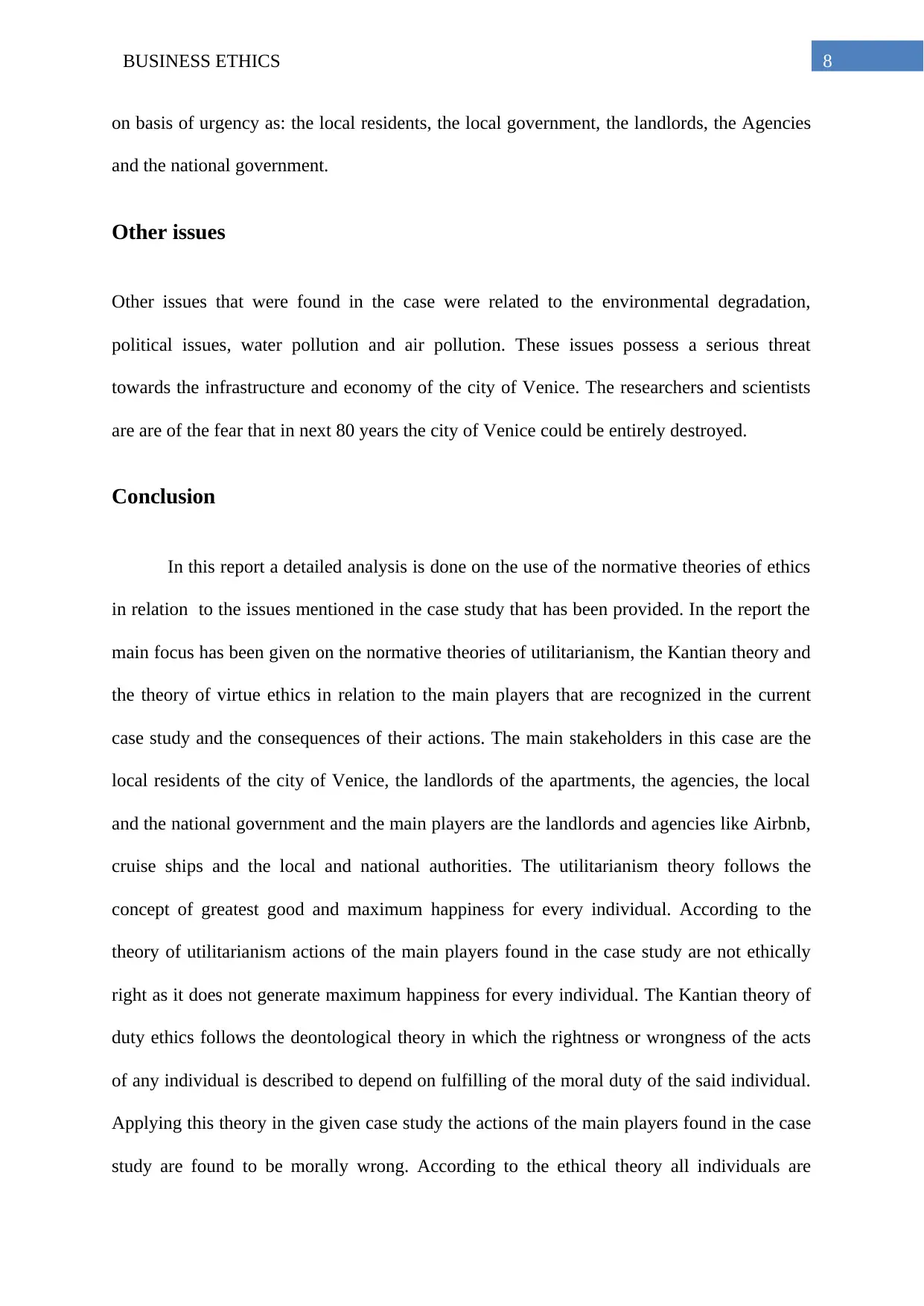
8BUSINESS ETHICS
on basis of urgency as: the local residents, the local government, the landlords, the Agencies
and the national government.
Other issues
Other issues that were found in the case were related to the environmental degradation,
political issues, water pollution and air pollution. These issues possess a serious threat
towards the infrastructure and economy of the city of Venice. The researchers and scientists
are are of the fear that in next 80 years the city of Venice could be entirely destroyed.
Conclusion
In this report a detailed analysis is done on the use of the normative theories of ethics
in relation to the issues mentioned in the case study that has been provided. In the report the
main focus has been given on the normative theories of utilitarianism, the Kantian theory and
the theory of virtue ethics in relation to the main players that are recognized in the current
case study and the consequences of their actions. The main stakeholders in this case are the
local residents of the city of Venice, the landlords of the apartments, the agencies, the local
and the national government and the main players are the landlords and agencies like Airbnb,
cruise ships and the local and national authorities. The utilitarianism theory follows the
concept of greatest good and maximum happiness for every individual. According to the
theory of utilitarianism actions of the main players found in the case study are not ethically
right as it does not generate maximum happiness for every individual. The Kantian theory of
duty ethics follows the deontological theory in which the rightness or wrongness of the acts
of any individual is described to depend on fulfilling of the moral duty of the said individual.
Applying this theory in the given case study the actions of the main players found in the case
study are found to be morally wrong. According to the ethical theory all individuals are
on basis of urgency as: the local residents, the local government, the landlords, the Agencies
and the national government.
Other issues
Other issues that were found in the case were related to the environmental degradation,
political issues, water pollution and air pollution. These issues possess a serious threat
towards the infrastructure and economy of the city of Venice. The researchers and scientists
are are of the fear that in next 80 years the city of Venice could be entirely destroyed.
Conclusion
In this report a detailed analysis is done on the use of the normative theories of ethics
in relation to the issues mentioned in the case study that has been provided. In the report the
main focus has been given on the normative theories of utilitarianism, the Kantian theory and
the theory of virtue ethics in relation to the main players that are recognized in the current
case study and the consequences of their actions. The main stakeholders in this case are the
local residents of the city of Venice, the landlords of the apartments, the agencies, the local
and the national government and the main players are the landlords and agencies like Airbnb,
cruise ships and the local and national authorities. The utilitarianism theory follows the
concept of greatest good and maximum happiness for every individual. According to the
theory of utilitarianism actions of the main players found in the case study are not ethically
right as it does not generate maximum happiness for every individual. The Kantian theory of
duty ethics follows the deontological theory in which the rightness or wrongness of the acts
of any individual is described to depend on fulfilling of the moral duty of the said individual.
Applying this theory in the given case study the actions of the main players found in the case
study are found to be morally wrong. According to the ethical theory all individuals are
⊘ This is a preview!⊘
Do you want full access?
Subscribe today to unlock all pages.

Trusted by 1+ million students worldwide
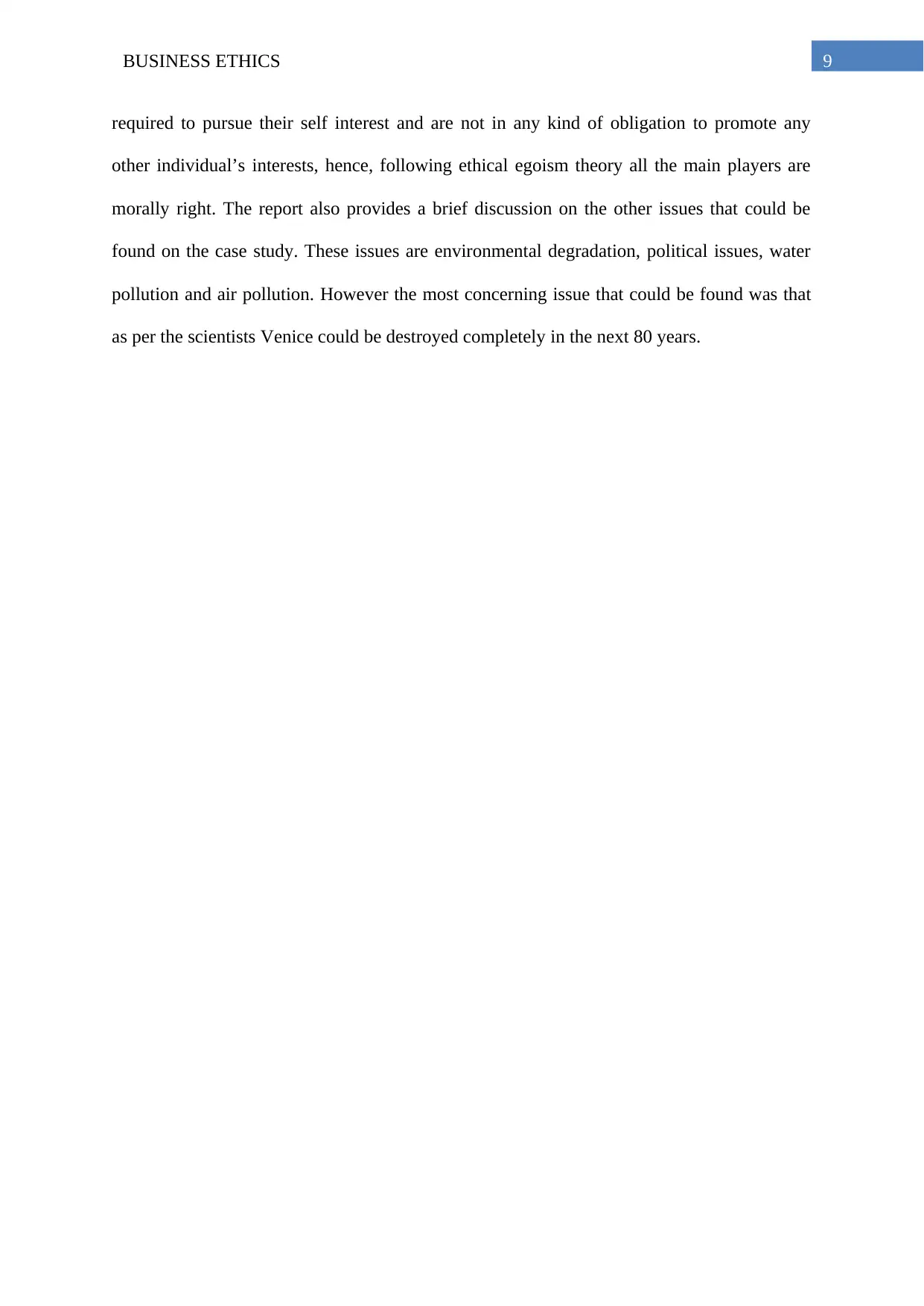
9BUSINESS ETHICS
required to pursue their self interest and are not in any kind of obligation to promote any
other individual’s interests, hence, following ethical egoism theory all the main players are
morally right. The report also provides a brief discussion on the other issues that could be
found on the case study. These issues are environmental degradation, political issues, water
pollution and air pollution. However the most concerning issue that could be found was that
as per the scientists Venice could be destroyed completely in the next 80 years.
required to pursue their self interest and are not in any kind of obligation to promote any
other individual’s interests, hence, following ethical egoism theory all the main players are
morally right. The report also provides a brief discussion on the other issues that could be
found on the case study. These issues are environmental degradation, political issues, water
pollution and air pollution. However the most concerning issue that could be found was that
as per the scientists Venice could be destroyed completely in the next 80 years.
Paraphrase This Document
Need a fresh take? Get an instant paraphrase of this document with our AI Paraphraser
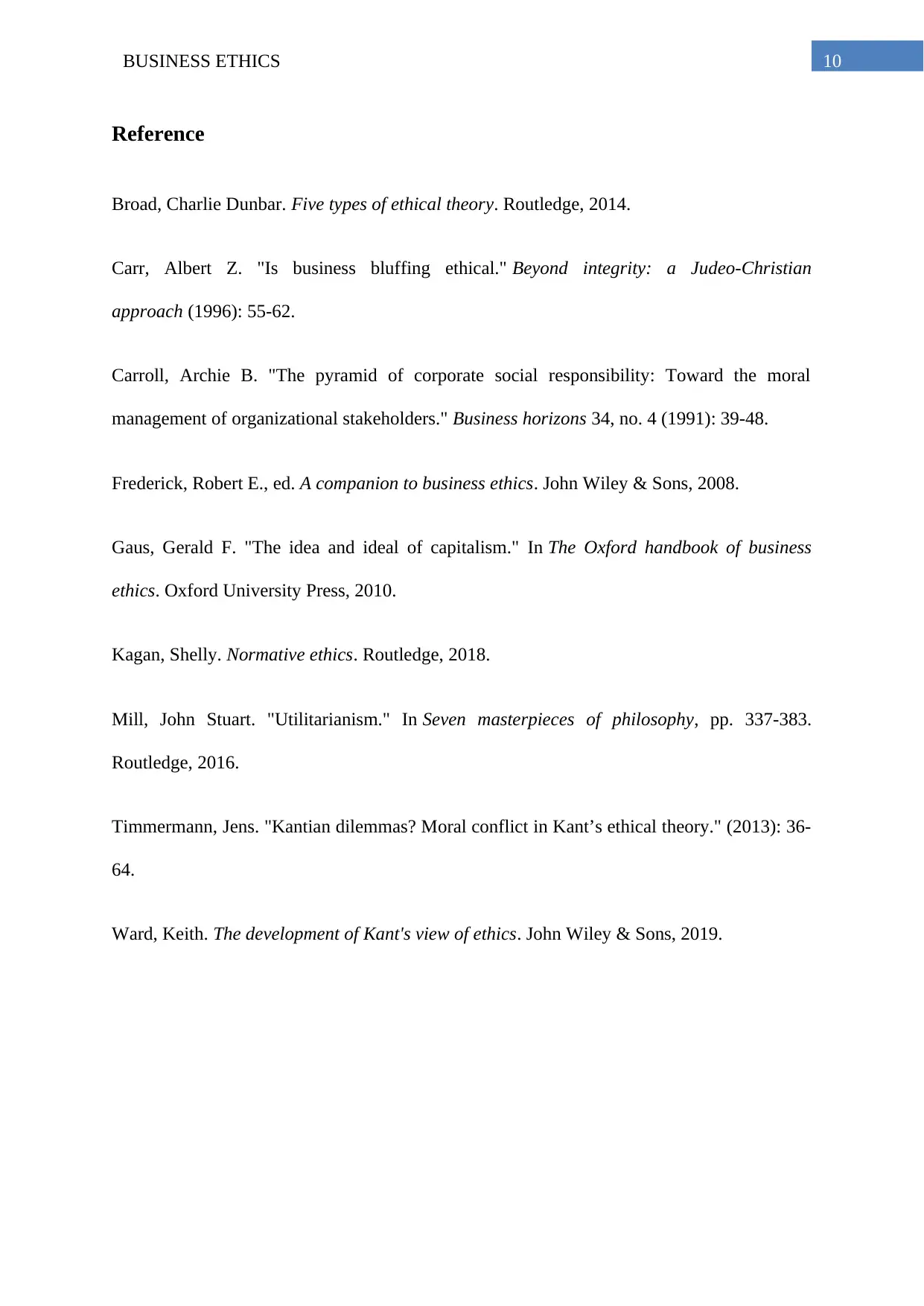
10BUSINESS ETHICS
Reference
Broad, Charlie Dunbar. Five types of ethical theory. Routledge, 2014.
Carr, Albert Z. "Is business bluffing ethical." Beyond integrity: a Judeo-Christian
approach (1996): 55-62.
Carroll, Archie B. "The pyramid of corporate social responsibility: Toward the moral
management of organizational stakeholders." Business horizons 34, no. 4 (1991): 39-48.
Frederick, Robert E., ed. A companion to business ethics. John Wiley & Sons, 2008.
Gaus, Gerald F. "The idea and ideal of capitalism." In The Oxford handbook of business
ethics. Oxford University Press, 2010.
Kagan, Shelly. Normative ethics. Routledge, 2018.
Mill, John Stuart. "Utilitarianism." In Seven masterpieces of philosophy, pp. 337-383.
Routledge, 2016.
Timmermann, Jens. "Kantian dilemmas? Moral conflict in Kant’s ethical theory." (2013): 36-
64.
Ward, Keith. The development of Kant's view of ethics. John Wiley & Sons, 2019.
Reference
Broad, Charlie Dunbar. Five types of ethical theory. Routledge, 2014.
Carr, Albert Z. "Is business bluffing ethical." Beyond integrity: a Judeo-Christian
approach (1996): 55-62.
Carroll, Archie B. "The pyramid of corporate social responsibility: Toward the moral
management of organizational stakeholders." Business horizons 34, no. 4 (1991): 39-48.
Frederick, Robert E., ed. A companion to business ethics. John Wiley & Sons, 2008.
Gaus, Gerald F. "The idea and ideal of capitalism." In The Oxford handbook of business
ethics. Oxford University Press, 2010.
Kagan, Shelly. Normative ethics. Routledge, 2018.
Mill, John Stuart. "Utilitarianism." In Seven masterpieces of philosophy, pp. 337-383.
Routledge, 2016.
Timmermann, Jens. "Kantian dilemmas? Moral conflict in Kant’s ethical theory." (2013): 36-
64.
Ward, Keith. The development of Kant's view of ethics. John Wiley & Sons, 2019.
1 out of 11
Related Documents
Your All-in-One AI-Powered Toolkit for Academic Success.
+13062052269
info@desklib.com
Available 24*7 on WhatsApp / Email
![[object Object]](/_next/static/media/star-bottom.7253800d.svg)
Unlock your academic potential
Copyright © 2020–2026 A2Z Services. All Rights Reserved. Developed and managed by ZUCOL.





